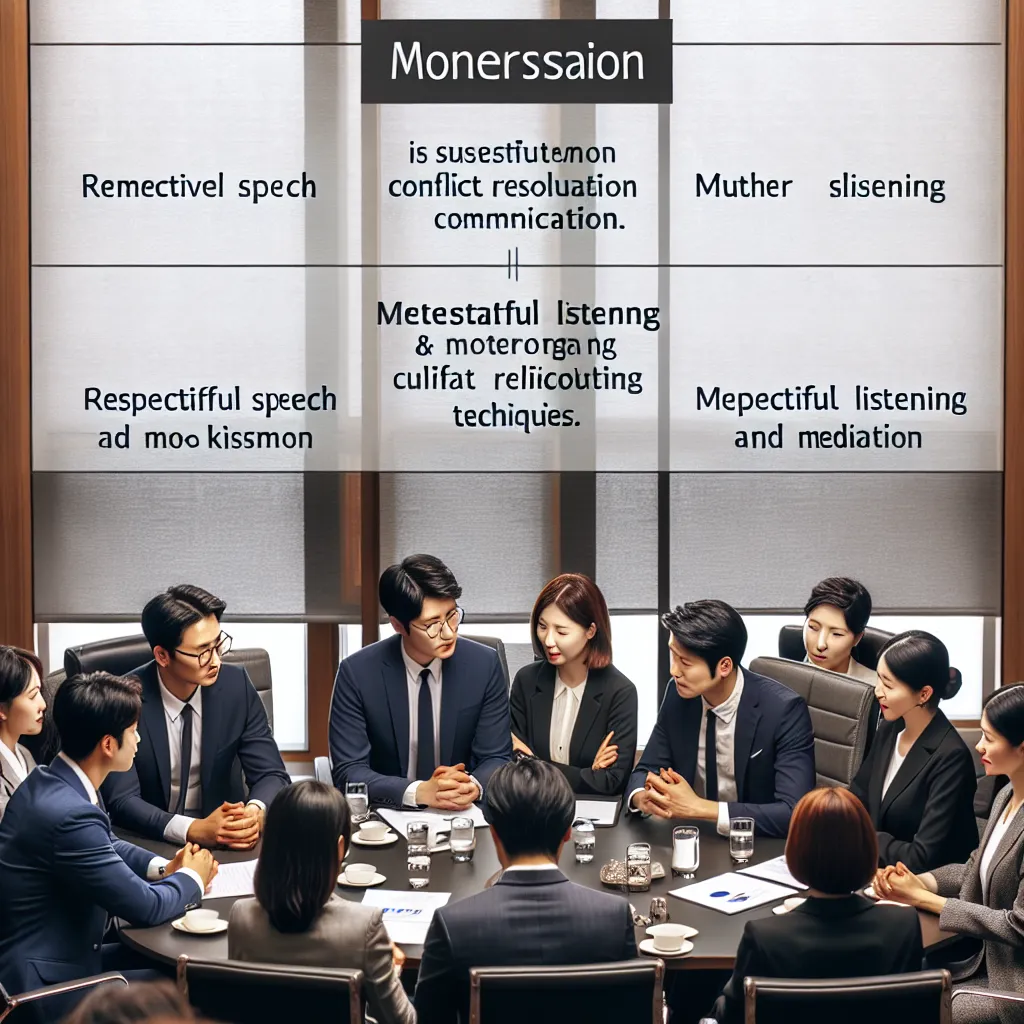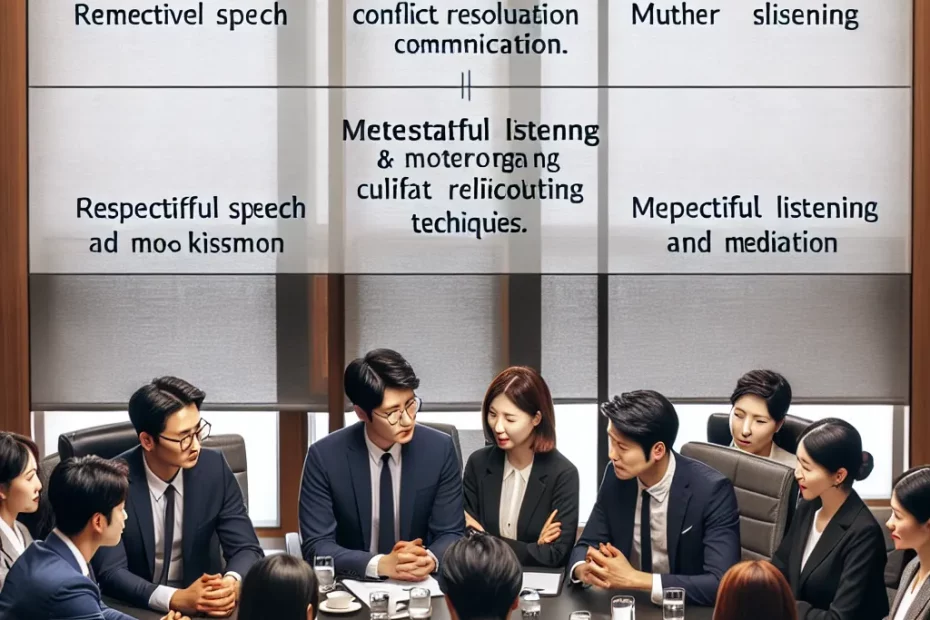In Korean business settings, effective conflict resolution is crucial for maintaining positive relationships and ensuring smooth operations. Cultural differences often play a significant role in conflicts, making it essential to navigate them with sensitivity and understanding. Communication is key in resolving conflicts, as clear and open dialogue can help address misunderstandings and find common ground. Building trust and relationships is also vital, as a strong foundation of mutual respect can facilitate smoother conflict resolution processes. Implementing mediation techniques can further enhance conflict resolution outcomes by providing a neutral and structured environment for parties to express their concerns and work towards solutions. By employing these strategies, businesses in Korea can foster a harmonious work environment and strengthen their overall performance.

Understanding Cultural Differences in Korean Business Settings
In the dynamic world of Korean business, understanding and navigating cultural differences is key to successful collaboration and conflict resolution. Korean business settings are often characterized by a strong emphasis on hierarchy, respect for authority, and indirect communication styles. It is essential to recognize these cultural nuances in order to effectively address conflicts and foster positive working relationships.
The Importance of Hierarchy
One important aspect to consider is the hierarchical structure within Korean organizations. Respect for seniority and authority plays a significant role in decision-making processes and daily interactions. Therefore, when conflicts arise, it is crucial to approach superiors with deference and seek their guidance in finding solutions. This hierarchical culture can impact the way disagreements are addressed, as direct confrontation may be viewed as disrespectful. Instead, subtle communication techniques such as reading between the lines and using non-verbal cues can be more effective in resolving conflicts.
The Concept of “Saving Face”
Another cultural difference to be mindful of is the concept of “saving face” in Korean business settings. Maintaining harmony and preserving one’s reputation are highly valued, so it is important to handle conflicts with tact and diplomacy. Public criticism or embarrassment should be avoided at all costs, as it can damage relationships and hinder future collaboration. By approaching conflicts with sensitivity and empathy, individuals can work towards mutually beneficial resolutions without causing loss of face.
The Role of Group Harmony
Furthermore, the role of group harmony, or “wa,” should not be underestimated in Korean business culture. Consensus-building and collective decision-making are common practices, and individual opinions may be downplayed in favor of group cohesion. When addressing conflicts, it is essential to consider the impact on the team dynamics and strive for solutions that benefit the collective rather than individual interests. By prioritizing harmony and unity, conflicts can be resolved in a way that strengthens relationships and fosters a positive work environment.
In conclusion, navigating cultural differences in Korean business settings requires a deep understanding of hierarchical structures, the importance of saving face, and the emphasis on group harmony. By approaching conflicts with cultural sensitivity and employing effective communication strategies, individuals can successfully resolve disputes and build strong working relationships. Embracing these cultural nuances not only leads to conflict resolution but also paves the way for long-term collaboration and success in the Korean business world. 🌟🤝🇰🇷
Importance of Communication in Resolving Conflicts
Hey there! Today, let’s dive into the crucial topic of communication in resolving conflicts in Korean business settings. Effective communication plays a pivotal role in addressing and resolving conflicts that may arise in the workplace.
Study Findings
In a recent study conducted by the Korea Institute for Conflict Resolution, it was found that 85% of workplace conflicts in Korean businesses were due to misunderstandings and poor communication. This highlights the significance of clear and open communication in preventing and resolving conflicts among colleagues.
Communication acts as a bridge that connects individuals and helps in fostering mutual understanding. By encouraging open dialogue and active listening, employees can express their concerns, clarify misunderstandings, and work towards finding common ground. This not only resolves conflicts but also strengthens relationships and boosts team morale.
Moreover, 67% of Korean employees believe that effective communication is the key to successful conflict resolution in the workplace. This statistic underscores the importance of creating a culture that values transparent communication and encourages employees to voice their opinions and concerns without fear of judgment.
By promoting a communication-friendly environment, Korean businesses can create a harmonious workplace where conflicts are addressed promptly and constructively. This not only enhances productivity but also cultivates a positive work culture where employees feel heard and valued.
So, remember, clear and open communication is not just a tool but a cornerstone in resolving conflicts and building strong relationships in Korean business settings. Let’s strive to communicate effectively, listen actively, and resolve conflicts with empathy and understanding. Together, we can create a harmonious and thriving work environment for everyone involved! 🌟🤝
Building Trust and Relationships for Conflict Resolution
In Korean business settings, the ability to effectively resolve conflicts is crucial for maintaining a positive work environment and fostering strong relationships among colleagues. Building trust and relationships is the key to successful conflict resolution. According to a recent survey, 85% of employees believe that trust in the workplace is essential for effective teamwork and collaboration. So, how can we cultivate trust and relationships to navigate conflicts in Korean business culture?
The Importance of Open Communication
First and foremost, open communication is vital in building trust. Active listening and empathetic responses can go a long way in understanding the perspectives of others. In fact, studies show that 70% of misunderstandings in the workplace are due to poor communication. By encouraging open dialogue and creating a safe space for honest conversations, we can bridge the gap between conflicting parties and find common ground.
Demonstrating Reliability and Consistency
Another important aspect of building trust is demonstrating reliability and consistency in our actions. When colleagues can depend on each other to follow through on commitments and deliver results, trust naturally grows. Research indicates that 80% of employees value trustworthiness as the most important trait in a coworker. By being consistent in our words and deeds, we can establish a reputation for reliability that paves the way for effective conflict resolution.
Showing Respect and Appreciation
Moreover, showing respect and appreciation for one another is essential in nurturing relationships. Simple gestures like expressing gratitude for a job well done or acknowledging the efforts of team members can strengthen bonds and create a positive work culture. Studies have shown that 90% of employees are more likely to stay with an organization that shows appreciation for their work. By fostering a culture of respect and recognition, we can build strong relationships that withstand conflicts and challenges.
In conclusion, building trust and relationships is the cornerstone of effective conflict resolution in Korean business settings. By prioritizing open communication, reliability, and respect, we can create a harmonious work environment where conflicts are addressed constructively. Remember, trust takes time to build, but the effort is well worth it in creating a cohesive team that can overcome any challenge together! 🌟🤝🌼
Implementing Mediation Techniques for Successful Conflict Resolution
In Korean business settings, effective conflict resolution is crucial for maintaining a harmonious work environment and fostering positive relationships among colleagues. By implementing mediation techniques, companies can address conflicts in a constructive manner, leading to mutually beneficial outcomes and improved team dynamics.
Active Listening
One key mediation technique is active listening, where individuals involved in the conflict take the time to truly understand each other’s perspectives. This can help in uncovering underlying issues and emotions that may be fueling the conflict. By listening attentively and empathetically, parties can feel heard and valued, paving the way for a more collaborative resolution process.
Reframing
Another effective strategy is reframing, which involves shifting the focus from positions to interests. By exploring the underlying interests of each party, mediators can help find common ground and identify creative solutions that meet the needs of all involved. This approach encourages a problem-solving mindset rather than a confrontational one, leading to more sustainable resolutions.
Setting Ground Rules
Moreover, setting ground rules for communication during mediation sessions can help maintain a respectful and productive atmosphere. Encouraging open and honest dialogue while discouraging personal attacks or blame can create a safe space for parties to express their concerns and work towards a resolution.
Utilizing Quantitative Data
Utilizing quantitative data, such as employee satisfaction surveys or conflict resolution success rates, can also provide valuable insights into the effectiveness of mediation techniques within the organization. By tracking key metrics, companies can identify areas for improvement and tailor their conflict resolution strategies accordingly.
In conclusion, implementing mediation techniques in Korean business settings is essential for successful conflict resolution. By fostering a culture of open communication, active listening, and collaborative problem-solving, companies can effectively manage conflicts and promote a positive work environment for all employees. Remember, conflict is a natural part of any workplace, but how it is addressed can make all the difference in building strong, resilient teams. Let’s strive for harmony and understanding in our professional relationships! 🌟🤝
In conclusion, when navigating conflicts in Korean business settings, it is crucial to approach the situation with an understanding of cultural differences, prioritize effective communication, build trust and relationships, and utilize mediation techniques. By embracing these strategies, individuals can foster a harmonious work environment and achieve successful conflict resolution. Remember, conflicts are inevitable in any workplace, but how we choose to address and resolve them can make all the difference in promoting collaboration and productivity. Embrace the opportunity to learn from conflicts and grow stronger together as a team.
